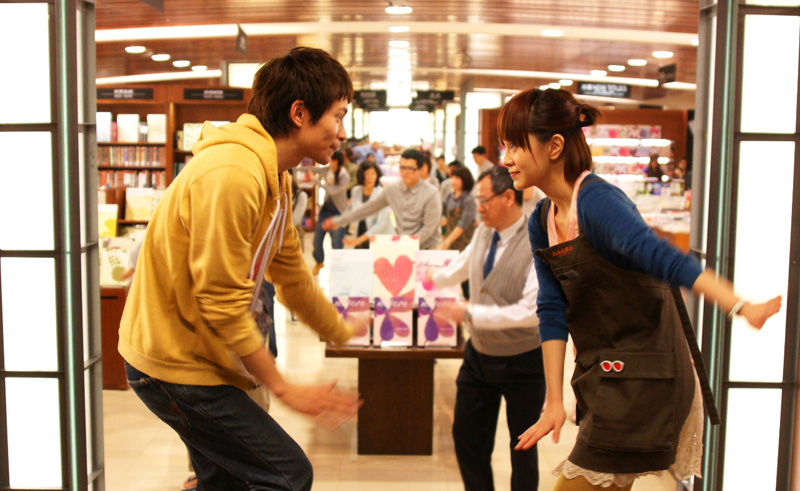Asian Pacific Film Festival

Actors Jack Yao and Amber Kuo in a scene from “Au revoir Taipei,” a narrative film by Arvin Chen, which will be screened as the opening night film of the 2010 Los Angeles Asian Pacific Film Festival.
By Anna Musky-Goldwyn
April 29, 2010 9:11 p.m.
Film festivals often screen movies that may have been otherwise overlooked by the public eye. The upcoming Asian Pacific Film Festival is no different, but it strives to accomplish goals on a more social level as well.
The festival, which began Thursday and runs until May 8, will be showing films from a large range of Asian, Pacific and Asian American artists at the Director’s Guild of America Theatre here in Los Angeles.
Visual Communications, the group that puts on the festival, has been advocating the media art of Asians and Asian Americans since the 1970s.
“The main objective was documenting our communities and presenting them in long or short films,” said Bob Nakamura, a founder of Visual Communications and the director of the Center for EthnoCommunications in the UCLA Asian American Studies Center.
The program started at UCLA with the cooperative program between the School of Theater, Film and Television and students of color. Nakamura and his peers wanted to start a community-based, Asian American production company.
“The larger goal of Visual Communications is to provide a place to present more accurate depictions of Asians and Pacific Islanders in America,” said Abe Ferrer, co-director of the film festival and an employee of Visual Communications.
The tradition of the Asian Pacific Film Festival rests in its ability to showcase art of a specific community that has up until now, according to Nakamura, been somewhat overlooked by the mainstream film industry. Ferrer described the festival as one about being an active participant in American film society, not an outsider.
However, Visual Communications still looks at the film festival as an integral part of the community it is trying to serve. David Magdael, co-director of the festival, described the festival as a collaboration.
Often working individually and on different ends of the globe, it is difficult for the filmmakers to regularly meet as a group.
“Now, they can meet each other. The whole spirit of the festival is community,” Magdael said.
This collaboration of art also enables the public to hear stories from Asians and Asian Americans about themselves. Mainstream media has put a certain stereotype out to the public that films such as the ones shown at the festival critique.
“Part of being able to see ourselves and hear ourselves is another way of deprogramming ourselves,” Nakamura said.
Nakamura noted the visual nature of racism and said that these films help Asian Americans rescind the popular views that have formed.
While this year’s festival is not particularly different from those in the past, it does highlight the growing success and aspirations of Asian filmmakers. Magdael said that there has been an increase in the amount of features entering the festival.
This year, the opening film is titled “Au revoir Taipei,” written and directed by Arvin Chen. The quirky and action-packed love story premiered at the Berlin Film Festival this year and has been extremely well-received. After Chen submitted a film in 2007, Magdael is looking forward to showing his latest feature on opening night.
Although it is only one example of the vast lineup of showings over the next two weeks, “Au revoir Taipei” has utilized the circuit of film festivals to create an audience for itself.
Professor Nakamura described the Asian Pacific Film Festival as a venue to garner interest and audience for films.
The festival offers new models of delivery, as opposed to the mainstream method of distribution run by large studios.
The film festival has not only garnered increasing support over the years, but also has continued to document the expanding community on which it was founded. Hopeful for the turnout and success this year, Ferrer noted the emerging importance of Asian cinema in the industry.
“(The festival) offers a fundamentally different representation of our experiences,” Ferrer said.

